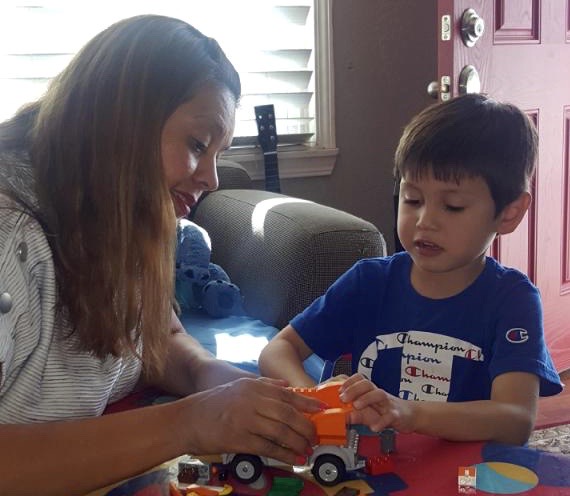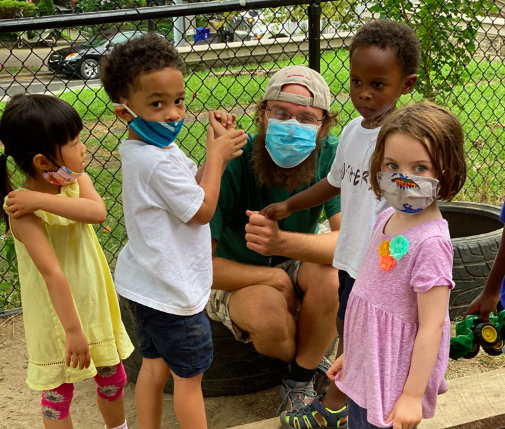‘Where Are the Rest of You?’ With as Many as 600,000 Students Skipping Kindergarten During the Pandemic, Districts Plead With Parents Not to Delay

Like many preschool parents last spring, Sara Mauskopf tried to keep her 4-year-old daughter, Bryn, interested in Zoom sessions with her classmates. “She didn’t hate it,” said Mauskopf. “Kids will just sit in front of the screen, but they’re not engaging and not getting much out of it.”
With two younger siblings at home, Bryn was happy to get back to her preschool when it reopened in June, Mauskopf said. And when it became clear that schools in their San Francisco Bay Area community wouldn’t reopen in person, Mauskopf chose to put kindergarten off for now.
“I want her to interact with kids her own age,” Mauskopf said, but she added that “this was not money I was planning to spend.”
The Mauskopfs are among families across the country opting to hold their children out of kindergarten rather than commit to an unpredictable school year. Districts nationwide are reporting steep drop-offs in kindergarten enrollment, especially in low-income communities. One researcher estimated, based on a national sample, that as many as 600,000 children might not be starting kindergarten on schedule this year.
“All across the income spectrum, parents are opting out of online kindergarten,” said Jenny Hontz, the communications director for Speak Up, a Los Angeles advocacy group. “The common thread is that most people don’t think online learning works well for very young kids.”
Educators generally agree that virtual learning is a poor substitute for the interactive, hands-on learning that children get in an actual classroom. But they also say that putting off some academic routines could make adjustment to school more difficult next year.
“Kindergarten is such an important year where so many foundational skills are taught, both academic and social-emotional,” said Aaron Loewenberg, an education policy analyst at New America, a center-left think tank. “I expect many children will begin first grade in need of a lot of extra support to help them access the first-grade curriculum.”
‘I need you all in kindergarten’
The Los Angeles Unified School District reported 6,000 fewer kindergartners than this time last year — and that’s in spite of “posting a banner at every elementary school, a message on school marquees and a flier on school websites, reminding parents to enroll their child,” said spokeswoman Barbara Jones. “Principals also used robocalls and email blasts to encourage parents to enroll their child and to make sure they’re attending class.”
Signs on school buses, a fence banner at a football stadium and radio ads are among the marketing strategies that the Austin Independent School District in Texas is using to recruit late sign-ups, according to spokesperson Cristina Nguyen. The district plans to begin opening classrooms for students in the early grades on Oct. 5.
In Georgia, Gwinnett County Public Schools was expecting more than 12,000 kindergartners this fall, but so far, only about 10,600 have enrolled. “Due to the pandemic, we were not able to do our normal kindergarten registration activities in May,” said spokeswoman Sloan Roach.
Kindergarten enrollment in the Clayton County Public Schools, another metro Atlanta district, is also down by more than 600 students.
“Where are the rest of you? I need you all in kindergarten,” Superintendent Morcease Beasley pleaded in a YouTube live video last week, in which he also laid out the fiscal impact to the district. “If we have a reduction in enrollment this year, that means we’re going to have a reduction in funding next year.”
Georgia districts are also seeing enrollment drops in the state’s pre-K program. Beasley acknowledged on the video that some families might already have their children in an early-childhood program that they don’t want to leave. But he said data also show that half of the county’s 4-year-olds were not enrolled anywhere.
“Some people are using the virtual environment as a reason not to be in school,” Beasley said on the video. “We need you to take advantage of these available seats.”
Eleven states and the District of Columbia currently require parents to enroll their children in school at age 5. In the rest of the country, the compulsory attendance age is 6 or 7. But according to the Education Commission of the States, parents can usually request a waiver if they prefer to not send their child to kindergarten.
‘An unsure bet’
Data from the National Institute for Early Education Research showed that in the spring, participation in preschool fell by half nationally as families stopped logging on to virtual classrooms. Children whose parents have low levels of education were the least likely to stay connected.
Now that many of those children are old enough for kindergarten, parents — regardless of socioeconomic status — are choosing between staying in an in-person early-childhood program they already have, keeping their children at home but not enrolling, or enrolling without knowing how much of the year will be conducted remotely or in-person.
In Los Angeles Unified, teachers have been shifted around and classes in the early grades have been combined because of the lower-than-projected numbers in kindergarten. But after pressure from parents and Nick Melvoin, a board member, the district decided to provide additional funding to schools to keep their teachers, even if classes are under-enrolled.
“We know that stability is especially important during this stressful and difficult time for our families and kids,” Melvoin wrote on Facebook. And Superintendent Austin Beutner sent a letter to principals saying that continuity is important “to build the foundation in literacy, math and critical thinking skills by third grade.”
Some parents — typically those who are more affluent — have long preferred to delay kindergarten, with the thought that “red-shirting” their children will give them an academic advantage. The cost of another year of preschool or child care, however, is usually what convinces them otherwise, suggested Walter Gilliam, a professor of child psychiatry and psychology at Yale University.
But now, many families no longer have the choice — they have to provide or find care for their 5-year-olds whether or not they enroll in kindergarten.
Gilliam added that because “kindergarten may appear to be an unsure bet” academically this year, it’s possible that parents would prefer to put it off and pay for another year of child care.
Needing ‘full-time support’
Nereida Pena’s son Ethan will turn 5 in November, and in a normal year, he would have been starting transitional kindergarten, a California program for children with late-year birthdays. But she’s decided to keep him in preschool at the Kidango center in Newark that he was already attending.
“He’s learning all his letter sounds and everything. I feel like he’s not missing anything,” Pena said. She added that when he was home while the preschool was closed, he was frequently upset. “Every day he was like, ‘I miss my friends. I miss circle time.’”

The demands that virtual school places on parents, however, is also a key factor in their decisions — especially if they have to work outside of the home. “Families may lack the ability to provide full-time support at home for online learning, which is necessary for very young learners,” Beutner said when he announced enrollment numbers in Los Angeles.
Pena said her mother would have been available to stay with Ethan, but “she doesn’t know a lot about computers.”
While some families have joined learning pods or hired tutors to monitor virtual learning, surveys are showing that most families whose young children are learning remotely are managing it on their own.
Recent data from the Rapid Assessment of Pandemic Impact on Development – Early Childhood, led by University of Oregon psychology professor Philip Fisher, show that out of 1,000 parents, 80 percent say a parent is overseeing distance learning, often for multiple children. In 25 percent of Black and single-parent households, grandparents are also picking up a lot of the responsibility for monitoring remote learning.
Additional results not yet published show that of the 242 families with a child who was supposed to go to kindergarten this fall, 42 decided to delay. “If these numbers are representative, it means there are over 600,000 children in the U.S. who haven’t started kindergarten on schedule this year,” Fisher said.
Most who opted to delay responded that they were concerned about safety, and half of them said they wouldn’t be able to manage their children’s virtual kindergarten program at home along with other responsibilities.
Another new survey shows that the “work-from-home” parent is the primary caregiver in 25 percent of households — up from 13 percent before the pandemic. Conducted by Winnie, an online child care and preschool marketplace, and Home Grown, a nonprofit focusing on home-based providers, the results show that parents still prefer group classes for their children but are either concerned about safety or don’t have an open site to send them to.
Child care providers who now have kindergarten-age children in their programs have also adjusted their formats to accommodate those who are staying back.
In West Philadelphia, for example, about 20 5-year-olds at the Parent Infant Center are participating in the School District of Philadelphia’s distance learning program, with center teachers providing oversight. Most of their parents secured a spot at Penn Alexander School next door through a lottery and did not want to give that up, said center director Deb Green.
But the parents of another seven children decided not to enroll in the virtual program — either because they didn’t think their children would pay attention to Zoom lessons or because they didn’t feel it was an appropriate way to teach young children, Green said.

“For the kids who thought they were going to kindergarten, the families really had to put a new spin on it,” she said. Those unenrolled children are in mixed-age classrooms where they can “explore the curriculum at the level they’re at,” Green said. “Our teachers are all degreed teachers. They understand child development.”
Others, however, worry about children who didn’t enroll but don’t have a spot in a highly rated center either. Beutner noted, for example, that kindergarten enrollment was down the most in lower-income households.
“A lot of these low-income children may not be getting any education,” said Hontz with Speak Up.
With kindergarten still voluntary in most states, many 5-year-olds not attending kindergarten this fall will likely head to first grade next year.
“That means that, for these kids, first grade will serve as the important transition year that kindergarten typically does,” Loewenberg said. “Hopefully, schools and districts will adjust to this reality and prioritize the transition to first grade for these kids in the same way many currently prioritize the transition to kindergarten.”
Get stories like these delivered straight to your inbox. Sign up for The 74 Newsletter

;)
